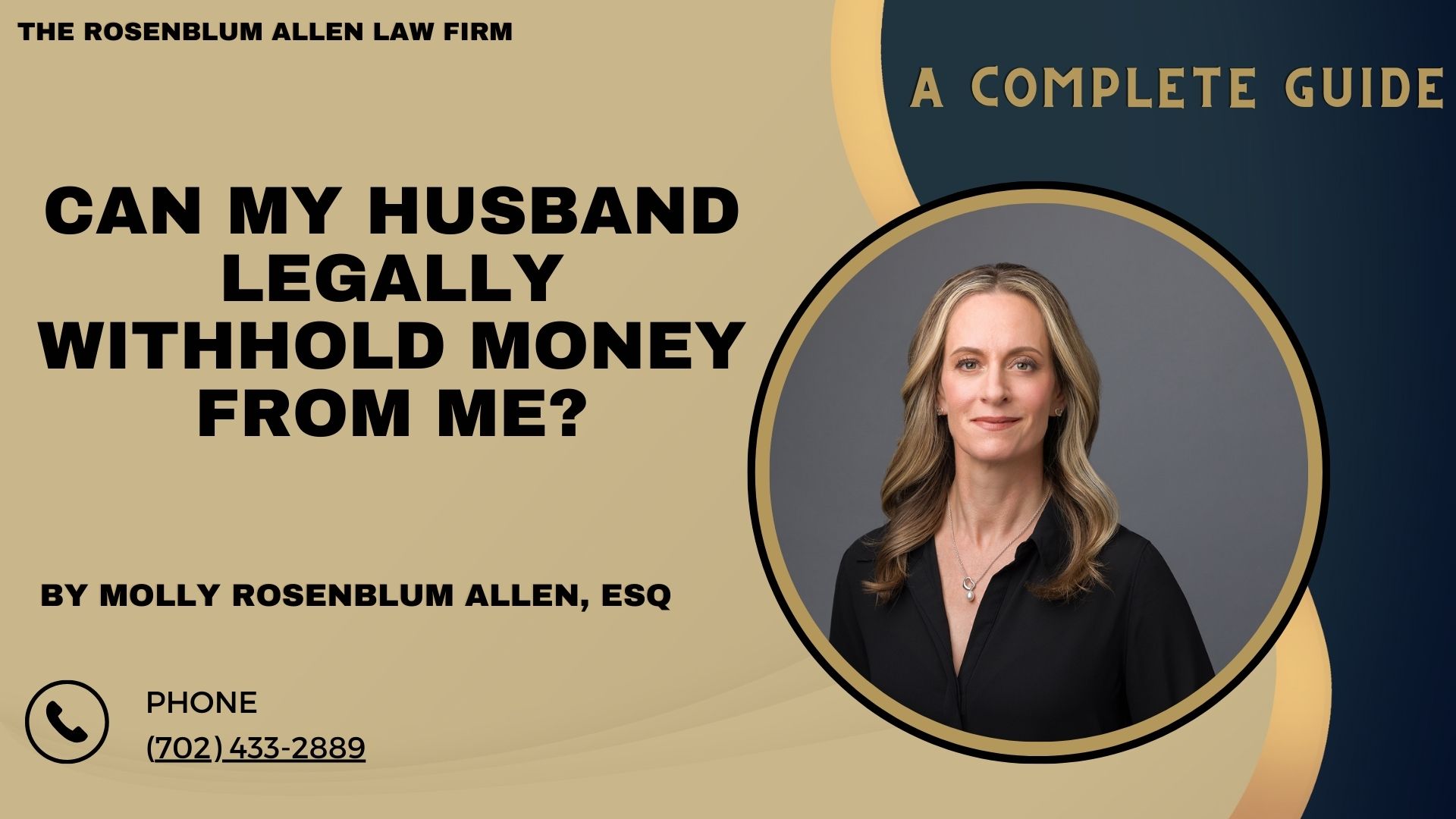Marital finances can be confusing. Can my husband legally withhold money from me? This guide clarifies your rights in uncertain times. Understanding the legal landscape empowers you. Financial issues or seeking knowledge may prompt this step.
 Understanding Marital Finances
Understanding Marital Finances
Marriage intertwines not just two lives but also two financial destinies. Let’s break down the basics of how the law views this union economically.
The Concept of Marital Property
Most money disputes in marriage involve marital or community property. But what does it include, and how does your state view it?
Definition and Examples: Marital property consists of assets and debts acquired by either spouse during the marriage. This can range from salaries to real estate and even debt.
Common Law vs. Community Property States: The distinction is crucial. In community property states, assets acquired during marriage are considered jointly owned. In contrast, standard law recognizes the person who acquired the asset as the owner, although division upon divorce aims to be fair and equitable.
Separate Property Explained
Not everyone divides all assets. One spouse solely owns separate property. It has nuances.
How Separate Property is Defined: Assets owned before marriage, inheritances, and gifts given explicitly to one spouse are typically considered separate property.
Exceptions to the Rule: It’s sometimes cut and dry. Mixing separate and marital assets can complicate things, potentially turning separate property into marital property.

Legal Perspectives on Withholding Money
The legal system provides guidelines on how a spouse can control access to money. It clarifies legal versus illegal withholding.
Can My Husband Legally Withhold Money from Me?
Understanding the legality involves examining the reasons for withholding and your jurisdiction’s laws.
Certain circumstances might warrant withholding money to protect assets or during legal separation.
Withholding access to marital funds without cause may constitute financial abuse. This can be considered illegal, especially when used for control or punishment.
Financial Abuse in Marriages
One partner in domestic violence controls economic resources, a form of financial abuse.
Financial abuse is controlling a spouse’s access to money. It includes limiting financial resources.
Financial abuse signs include denying access to bank accounts and imposing excessive accountability for spending.
Victims of financial abuse have legal recourse. Restraining orders and divorce settlements protect them and secure shared financial resources.
Understanding marital finances and legalities helps you navigate your marriage’s financial dynamics. Knowledge is a pathway to financial independence and security.

Your Rights and Protections
Knowing your rights is like having a roadmap in a foreign city. It guides you through unfamiliar streets, ensuring you reach your destination safely. Understanding your rights is critical to navigating potential challenges in marital finances.
Accessing Marital Finances
If you find the financial doors locked, knowing how to unlock them is crucial.
Steps to Take if You’re Denied Access to Marital Funds:
Document everything: Keep records of instances where access was denied.
Communicate: Try to discuss the issue with your spouse if it is safe to do so.
Seek Legal Advice: A family law attorney can provide guidance specific to your situation.
Court Orders: In extreme cases, the court can order your spouse to provide access.
Legal Measures to Ensure Fair Access to Money:
Temporary Orders: During a separation or divorce, courts can issue orders for temporary financial support.
Enforcement: Legal consequences can follow if a spouse fails to follow court orders.
Protecting Your Financial Interests in Marriage
Marriage shouldn’t mean losing your financial identity or security. Here’s how you can protect yourself.
Prenuptial and Postnuptial Agreements: Not just for the wealthy, these agreements can clearly define what happens to your finances in various scenarios, including divorce.
Strategies for Maintaining Financial Independence:
Maintain separate accounts for personal use.
Be involved in financial planning and decision-making.
Understand where your money goes and how assets are managed.

Navigating Divorce and Financial Settlements
Divorce can feel like a storm, turning your world upside down. Financially, it’s about securing your safety net for the future.
Understanding Fair Distribution
Fair distribution is your anchor in a divorce, ensuring fair asset division. Assets may not always be split equally.
How Assets Are Divided in a Divorce:
Consideration of each spouse’s economic circumstances.
Duration of the marriage and contributions (including non-financial) by each spouse.
The future needs of each spouse.
Alimony and Financial Support
Alimony in Nevada ensures fair financial support after divorce. No one is penalized.
Types of Alimony:
Temporary: Support during the divorce process.
Permanent: Support that continues after the divorce until the death or remarriage of the recipient.
Rehabilitative: Support for a spouse to become self-sufficient through education or training.
Determining Eligibility for Alimony:
Marital Lifestyle: The standard of living established during the marriage.
Earning Capacity: Each spouse’s earning ability is based on education, skills, and experience.
Contributions to the Marriage: Including career sacrifices to support the other spouse’s career or care for children.
Understanding your financial rights and protections is crucial. It helps in navigating withholding and divorce confidently. Clarify your understanding for better handling these challenges. Knowledge empowers you to make informed decisions. It ensures a fair and secure financial future.

Seeking Legal Assistance
Finding yourself at a crossroads, where the next turn could significantly impact your life, is daunting. Legal issues, especially those entangled with emotions, can feel like a labyrinth. Here’s how to seek guidance, ensuring you’re not walking through it alone.
When to Seek a Lawyer
Identifying the moment when legal advice becomes necessary is like recognizing when you need a map in unfamiliar territory.
- Identifying the Need for Legal Advice:
- Continuous financial disputes and withholding with no resolution in sight.
- When considering separation or divorce, you need to understand your financial rights.
- You are experiencing financial abuse or control that limits your access to marital assets.
- Choosing the Right Attorney for Your Case:
- Specialization: Look for a lawyer specializing in family law or specifically in divorce and financial disputes.
- Recommendations: Personal referrals or professional reviews can guide you to reputable attorneys.
- Consultations: Many lawyers offer free initial consultations to discuss your case briefly and gauge compatibility.
Preparing for Legal Consultation
Walking into a lawyer’s office without preparation is like navigating a storm without a compass. Here’s how to prepare effectively.
- Documents and Information to Bring:
- Financial documents: Bank statements, pay stubs, tax returns, and any documentation of joint and separate assets.
- Communications: Any relevant emails, texts, or written communications between you and your spouse regarding financial matters.
- Personal identification and marriage documents.

Breaking It All Down
Knowing your legal rights is like holding a lantern in the dark. It guides you through marital financial disputes. The road may seem daunting. Knowing when to seek legal help can help you protect your finances and navigate the legal system. It can help you thrive.
Financial disputes in marriage, particularly involving withholding money, are personal and emotional. You can confidently navigate challenges with correct information, support, and legal guidance. Remember, seeking professional advice tailored to your unique situation is crucial. This journey secures your financial rights. It reclaims your independence and peace of mind.

Frequently Asked Questions
What is considered marital property versus separate property in a divorce?
Assets and debts acquired during marriage are marital property. They are divided upon divorce. Separate property includes assets owned before marriage. In a divorce, inheritances and gifts to one spouse are separate property and are not typically divided.
Can financial abuse affect the outcome of a divorce settlement?
Yes, financial abuse can significantly impact divorce proceedings and settlements. Courts consider financial abuse evidence in asset division, alimony, and child support cases. The goal is a fair outcome for the victim.
How can I protect myself financially if I suspect my spouse might file for divorce?
Open a new bank account for personal funds. Gather financial documents. Understand assets and debts. Consider consulting a financial advisor and a divorce attorney for financial security.
Is it possible to regain financial independence after a divorce?
Absolutely. After divorce, many people improve finances with planning, budgeting, career growth, and settlements.
How do prenuptial and postnuptial agreements affect divorce proceedings?
Agreements dictate asset distribution, alimony rights, simplifying divorces. Their impact depends on the specifics of the deal and its adherence to state laws.
What should I do if I'm not sure about my spouse's assets or suspect hidden assets?
Working with a divorce attorney and a forensic accountant is essential in such cases. They can help uncover hidden assets and ensure a fair division of property.
Can I deny my spouse access to our joint accounts if we decide to get a divorce?
Denying access to joint accounts without legal advice or a court order can lead to legal consequences. Seek legal advice before making financial decisions in divorce.
What happens to debt in a divorce?
Debt incurred in marriage is usually seen as marital debt. It gets split between spouses in divorce. The division depends on state laws and the specifics of each case.
Are assets acquired after separation but before divorce considered marital property?
This can vary by state. Some states consider assets acquired after separation as separate property. Other states consider them marital property until the divorce is finalized.
How can I protect my children financially during and after the divorce?
Securing child support helps protect your children financially. Setting up trusts for education and expenses is also beneficial. Including provisions in your divorce settlement is another way to safeguard their future.
What resources are available for victims of financial abuse?
Domestic violence hotlines, financial counseling, and legal aid support victims of financial abuse.
Can my husband cancel our joint credit cards or utilities during a divorce?
Canceling joint utilities or credit cards without agreement may complicate divorce proceedings. It’s best to manage these matters through legal channels or mutual agreement.

Additional Resources for You
We understand that navigating through family law issues can be complex and overwhelming. To support you in your time of need, our lead attorney, Molly Rosenblum Allen, Esq., has created a range of resources. These guides and articles cover various aspects of family law and are designed to provide you with the knowledge and understanding necessary to navigate your legal journey. Below are some of the resources available to you:
Las Vegas Family Law Attorneys: A comprehensive guide to family law services offered by our firm, covering all aspects of family law in Las Vegas. Explore more.
Family Court Las Vegas: Insights into navigating the Family Court in Las Vegas, offering guidance for those going through divorce, custody, and other family law proceedings. Learn more.
Common Law Marriage in Nevada: A detailed look at the status of common law marriage in Nevada, helping you understand the legal standing of your relationship. Read further.
Name Change Las Vegas: Guidance on the legal process for changing your name in Las Vegas, whether due to marriage, divorce, or personal choice. Discover how.
Nevada Power of Attorney: An essential guide to understanding and establishing a power of attorney in Nevada, ensuring your wishes are honored in times of need. Find out more.
How to File a Motion in Family Court: Step-by-step assistance on filing motions in family court, a crucial process for advancing your case. Get started.
Family Court Mediation: An overview of the mediation process in family court, offering an alternative to resolve disputes outside of the courtroom. Explore mediation.
Unbundled Attorney: Information on unbundled legal services, providing a more affordable option for legal assistance by paying for specific services rather than full representation. Learn about unbundled services.
Nevada Adoption: A resource for those considering adoption in Nevada, detailing the process, requirements, and legal considerations. Read about adoption.
These resources, created by Molly Rosenblum Allen, Esq., are designed to guide you through your legal matters with confidence. Whether you’re facing a family law issue, considering adoption, or need legal documentation, we’re here to help every step of the way.

Outside Resources for You
American Bar Association (ABA) Family Law Section: The ABA offers a wealth of information on family law, including articles, legal resources, and public education materials. Visit ABA Family Law Section.
National Domestic Violence Hotline: For those facing situations of domestic violence, including financial abuse, this hotline provides confidential support and resources. Visit National Domestic Violence Hotline.
FindLaw Family Law Center: FindLaw’s Family Law Center offers articles, resources, and a directory of lawyers specializing in family law across the United States. Visit FindLaw Family Law Center.
National Council of Juvenile and Family Court Judges (NCJFCJ): This organization provides resources and education for families and professionals navigating the juvenile and family court systems. Visit NCJFCJ.
Child Welfare Information Gateway: This resource offers information and resources on child welfare, child abuse and neglect, adoption, and more, helping families navigate complex situations. Visit Child Welfare Information Gateway.
WomensLaw.org: Dedicated to providing free legal information and support to victims of domestic violence and sexual assault, this site covers topics like restraining orders, custody, divorce, and immigration. Visit WomensLaw.org.
National Association of Consumer Advocates (NACA): For those facing financial abuse or issues related to consumer rights and protection, NACA provides resources and a directory of attorneys specialized in consumer advocacy. Visit NACA.

A Special Message from Our Lead Attorney, Molly Rosenblum Allen, Esq

Dear Readers,
Thank you for taking the time to explore our resources. I hope you found the information useful. It can empower you in your current situation. The Rosenblum Allen Law Firm grasps the challenges of family law. It recognizes its complexity and emotional toll. Our mission is to offer legal expertise, support, and guidance to those in need.
Feel ready to take steps? Have questions? Contact me and my team. Call us at (702) 433-2889. We will assist you and find the best solution.
Remember, you don’t have to face this alone. We will help you with legal matters and provide support during this tough time.
Warm regards,
Molly Rosenblum Allen, Esq.



